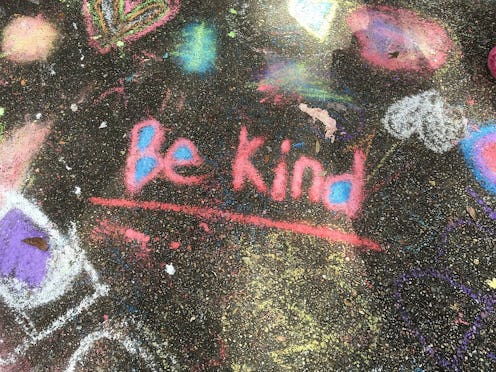Life
Why Do Random Acts Of Kindness Make Us Feel Good?
If you've ever needed a bit of encouragement to tell a stranger how nice they look or give flowers to a neighbor, today's Random Acts Of Kindness Day — a day when you're thoroughly encouraged to commit as many randomly kind acts as many as possible. And science supports doing it, too: research indicates that regularly being kind to others, with or without premeditation, is a good plan for general happiness levels and specific social issues. But why do these benefits occur, and what do they do to us that makes them such positives?
Why we commit altruistic acts is kind of a psychological puzzle. Technically, we should all be out for ourselves; but being kind to others could have two evolutionary benefits for us, even if on the surface, it looks like all cost to us and all benefit to somebody else. Acts of kindness towards people we know help cement social bonds and raise the possibility that they'll help us in our time of need, while acts of kindness towards strangers help our personal levels of satisfaction and happiness and our concepts of ourselves as moral beings. But while they may ultimately be a bit selfish in the abstract, a random act of kindness can be a decided boon for the human species.
It Creates A Small Uptick In Overall Happiness & Lowers Stress
The big thing to know about committing random acts of kindness regularly is that they're good for our psychological wellbeing. While the amount of happiness they seem to provoke has occasionally been exaggerated by studies, an overview of the science from the University of Oxford in 2016 found pretty concrete proof that a happiness benefit does exist. The scientists looked at 21 different studies on happiness and acts of kindness, and found that results indicated a "small to medium" happiness boost after committing them. Similarly, a 2015 study found that being "prosocial" in your behavior (including acting kindly towards others) was a boon to mental health, lowering stress levels overall. And scientists in 2016 found that being kind to others was actually more helpful to psychological "flourishing" than being kind to yourself; effective self-care, in other words, should probably include some acts of kindness towards others.
An Empathetic Brain Is Highly Tied To Altruistic Behavior
Empathy is a key part of human psychological make-up, and it seems that altruistic behavior, like kindness towards strangers with no obvious benefit to ourselves, is a product of that empathetic quality. Researchers in 2016 staged a situation in public that required the help of passers-by, and then rated the empathetic traits of those who stopped to help and those who didn't. The people who did stop showed more empathetic traits in general, though this may have to do with their self-conception rather than objective measurements.
When it comes to the neurological level, though, things start to get really interesting. "Extraordinary altruists" — people who are phenomenally kind or generous — show unique neurological patterns, according to a 2014 study of people who donated kidneys to compete strangers. They discovered that extraordinary altruists tend to have more volume in their right amygdala, and more responsiveness to detecting emotion in facial expressions — which is, as it happens, the direct opposite of what happens in the brains of psychopaths. Empathy is associated with the right amygdala in general, and increasing and decreasing its size seems to have direct impacts on our generosity towards others.
It May Stem From A Psychological Feedback Loop
If you start doing random acts of kindness, it's highly likely that you won't want to stop. The reason is a psychological feedback loop observed by researchers, one that's peculiar to happiness and altruism: happy people are inclined to be more altruistic, and altruism makes them happier. A 2006 study of Japanese students, for instance, found that the happier they were, the more likely they were to perform kind acts, and that thinking about those acts afterwards gave them joy.
More recently, other research has confirmed the happiness-altruism loop: a 2014 study found that places with higher overall wellbeing in the US were more likely to produce kidney donors, while 2016 research on the altruism feedback loop found that it could last as long as six weeks. "Positive activities," the scientists wrote, "served as triggers.... predicted greater prosocial effort, which in turn predicted greater well-being".
It Can Also Develop Our Social Skills, Even If We're Socially Anxious
The fact that acts of kindness are viewed as "prosocial" also has domino effects for our social ability, and it seems that the impact starts pretty young. Pre-adolescents in a 2012 Canadian study were either told to visit three places or perform three kind acts, and then their peers were asked to make a list of the children they'd most like to be in school activities with. The kids who performed the kind acts were rated as more popular in the period afterwards, which seems to reflect that they'd become more "prosocial" — even if the acts had nothing whatsoever to do with school or their friends.
And it's not just about young people. If you're socially anxious, acts of kindness may also help you feel more comfortable around social situations rather than intentionally avoiding them. The evidence for this comes from 2015 research on whether socially anxious people responded better to doing acts of kindness, or just exposure to social situations (which is the normal therapy procedure). The people in the study found themselves less inclined to avoid social situations after performing acts of kindness, even when compared to exposure therapy. So if you're feeling a bit less inclined to go to that party, make yourself give somebody a smile or a compliment; it might boost your prosociality enough to get you through the door.
